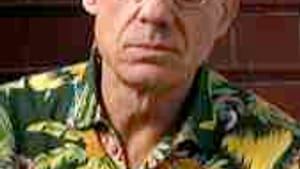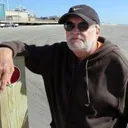Stay in the Loop
BSR publishes on a weekly schedule, with an email newsletter every Wednesday and Thursday morning. There’s no paywall, and subscribing is always free.
Through an American dream, darkly
James Ellroy's "Blood's A Rover'

James Ellroy's quietly fevered prose is a delirious amalgam of Ernest Hemingway and Gertrude Stein, with a dash of Don DeLillo thrown in for good measure. In The Cold Six Thousand (2001), Ellroy's telegraphic sentences are so short that they almost disappear, and the language is a startling hybrid that borders on the offensive but is finally hypnotic.
Ellroy's latest plunge into what has been called "political noir" is last year's Blood's A Rover, set variously in Las Vegas, Haiti and the Dominican Republic of the late '60s and early '70s but centered in Los Angeles, that fabled American dreamscape that Ellroy has staked out with the authority of a Raymond Chandler on LSD.
The movie version of L.A. Confidential provides a hint— a deep surface-scratching, if you will— of the casual moral cesspool that is James Ellroy's vision of America. His American dream is a high-definition nightmare of total political depravity that infects every character in his fiction, from presidents to bellhops. It is totally fascinating, perhaps because there is the sting of truth at its basis.
Blood's A Rover is the final work in Ellroy's Underworld USA trilogy, which also includes American Tabloid (1995) and The Cold Six Thousand. The title is derived from an A.E. Housman stanza: "Clay lies still, but blood's a rover:/ Breath's a ware that will not keep./ Up, lad: when the journey's over/ There'll be time enough to sleep."
Hughes, Nixon and JFK
Blood's A Rover is a thick, densely plotted tour de force that could well be Ellroy's masterwork to date. Its tightly controlled sprawl encompasses all of Ellroy's obsessions: political and law enforcement corruption; organized crime; high-profile players like Howard Hughes, J. Edgar Hoover and Richard Nixon; the assassinations of the Kennedy brothers and Martin Luther King, and the lower-level operatives who do their masters' bidding while simultaneously pursuing sometimes contradictory agendas produced by their own psyches and wounded personalities.
Blood's A Rover traces the twisting, violent paths of three of these amoral mercenaries: FBI agent and Yale graduate Dwight Holly, Edgar Hoover's secret enforcer and dirty trickster for Tricky Dick Nixon; Wayne Tedrow, ex-cop and mob man-of-all-missions with an advanced degree in heroin cooking; and Don Crutchfield, young peeping-Tom wheelman and gumshoe. Their paths cross and re-cross in a dizzying panoply of Black Panthers, killer cops, white radicals, voodoo ju ju, bigtime mob guys and walk-ons who casually confess that they hit MLK or JFK.
Blood on every page
As in all of Ellroy's fiction, here action is character. There isn't a page in more than 600 in Blood's A Rover that isn't chockablock with somebody doing something, usually shady or illegal or bloody.
Especially riveting are Ellroy's fictitious transcripts of phone conversations between FBI man Dwight Holly and Hoover and Nixon, both of whom he is obeying while simultaneously playing each against the other for his own personal and increasingly radical political needs.
For his part, Wayne Tedrow works his way into actual face-to-faces with Howard Hughes, known to insiders as "Count Dracula" or "Drac" for short, that great American recluse and cipher. Tedrow cooks up batches of super dope for Hughes even as he prods Hughes into buying Las Vegas casinos from his mob superiors at vastly inflated prices, thereby insuring that mob management will continue its vastly lucrative skimming operations that were the heart and soul of underworld Las Vegas at that time.
Ellroy's alter ego
Donald Crutchfield, the young wheelman and peeping-Tom known ironically as "Crutch," becomes a mass murderer as well, killing more than 20 Cuban soldiers on stealth raids from Haiti with an obsessed mercenary who was himself deeply involved in the killings of King and Jack Kennedy. Crutch later kills him, we are informed in a brief sentence.
Crutch also becomes an accomplished detective, whose drugged, sleep-deprived prowls through endless mounds of records and stalkings of various characters become a waking dream state, a pilgrimage into a shifting landscape of the real and the surreal in search of a woman he had seen only once, briefly. He is in many ways the young Ellroy, who was himself an accomplished juvenile delinquent "creeper," as well as an amateur sleuth into the murder of his mother, who he is convinced was the "Black Dahlia" of the infamous Los Angeles unsolved killing of the 1950s.
Fear of being influenced
Ellroy claims to read no fiction other than his own, lest his style be influenced. That style is short, flat, old-time slangy and totally unapologetic. If you don't like it, move on, is the message between the lines. Here he describes the entrance of Dwight Holly and Edgar Hoover into Harvey's Restaurant in Washington:
"Spooks: The restaurant was thick with them. Mr. Hoover ran a head count. Dwight watched his eyes click. Colored waiters, colored lobbyists, colored baseball ace. The old poof was frail. He slurped his soup palsy-style. He'd lost some beats, his brain still sparked, his circuits cranked on hate."
Ellroy's description of Wayne Tedrow's demise is minimalist poetry:
"He entered a tavern and ordered a potion. Six bokurs watched him drink it. Two men offered blessings. Four men waved amulets and hexed him. He left too much money on the bar.
"He walked outside. The sky breathed. He felt the moon's texture. Craters became emerald mines.
"An alleyway appeared. A breeze carried him down it. Leaves stirred and sent rainbows twirling. Three men stepped out of a moonbeam. They wore cross-draw scabbards. They had bird wings where their right arms used to be.
"Wayne said, "'Peace.'
"They pulled their machetes and cut him dead right there."
Crutch survives. He opens a successful detective agency. He sums up: "I'm making friends and enemies and roving at full speed. I've got that license to steal and that ticket to ride."
So it is, too, with his creator.
Ellroy's latest plunge into what has been called "political noir" is last year's Blood's A Rover, set variously in Las Vegas, Haiti and the Dominican Republic of the late '60s and early '70s but centered in Los Angeles, that fabled American dreamscape that Ellroy has staked out with the authority of a Raymond Chandler on LSD.
The movie version of L.A. Confidential provides a hint— a deep surface-scratching, if you will— of the casual moral cesspool that is James Ellroy's vision of America. His American dream is a high-definition nightmare of total political depravity that infects every character in his fiction, from presidents to bellhops. It is totally fascinating, perhaps because there is the sting of truth at its basis.
Blood's A Rover is the final work in Ellroy's Underworld USA trilogy, which also includes American Tabloid (1995) and The Cold Six Thousand. The title is derived from an A.E. Housman stanza: "Clay lies still, but blood's a rover:/ Breath's a ware that will not keep./ Up, lad: when the journey's over/ There'll be time enough to sleep."
Hughes, Nixon and JFK
Blood's A Rover is a thick, densely plotted tour de force that could well be Ellroy's masterwork to date. Its tightly controlled sprawl encompasses all of Ellroy's obsessions: political and law enforcement corruption; organized crime; high-profile players like Howard Hughes, J. Edgar Hoover and Richard Nixon; the assassinations of the Kennedy brothers and Martin Luther King, and the lower-level operatives who do their masters' bidding while simultaneously pursuing sometimes contradictory agendas produced by their own psyches and wounded personalities.
Blood's A Rover traces the twisting, violent paths of three of these amoral mercenaries: FBI agent and Yale graduate Dwight Holly, Edgar Hoover's secret enforcer and dirty trickster for Tricky Dick Nixon; Wayne Tedrow, ex-cop and mob man-of-all-missions with an advanced degree in heroin cooking; and Don Crutchfield, young peeping-Tom wheelman and gumshoe. Their paths cross and re-cross in a dizzying panoply of Black Panthers, killer cops, white radicals, voodoo ju ju, bigtime mob guys and walk-ons who casually confess that they hit MLK or JFK.
Blood on every page
As in all of Ellroy's fiction, here action is character. There isn't a page in more than 600 in Blood's A Rover that isn't chockablock with somebody doing something, usually shady or illegal or bloody.
Especially riveting are Ellroy's fictitious transcripts of phone conversations between FBI man Dwight Holly and Hoover and Nixon, both of whom he is obeying while simultaneously playing each against the other for his own personal and increasingly radical political needs.
For his part, Wayne Tedrow works his way into actual face-to-faces with Howard Hughes, known to insiders as "Count Dracula" or "Drac" for short, that great American recluse and cipher. Tedrow cooks up batches of super dope for Hughes even as he prods Hughes into buying Las Vegas casinos from his mob superiors at vastly inflated prices, thereby insuring that mob management will continue its vastly lucrative skimming operations that were the heart and soul of underworld Las Vegas at that time.
Ellroy's alter ego
Donald Crutchfield, the young wheelman and peeping-Tom known ironically as "Crutch," becomes a mass murderer as well, killing more than 20 Cuban soldiers on stealth raids from Haiti with an obsessed mercenary who was himself deeply involved in the killings of King and Jack Kennedy. Crutch later kills him, we are informed in a brief sentence.
Crutch also becomes an accomplished detective, whose drugged, sleep-deprived prowls through endless mounds of records and stalkings of various characters become a waking dream state, a pilgrimage into a shifting landscape of the real and the surreal in search of a woman he had seen only once, briefly. He is in many ways the young Ellroy, who was himself an accomplished juvenile delinquent "creeper," as well as an amateur sleuth into the murder of his mother, who he is convinced was the "Black Dahlia" of the infamous Los Angeles unsolved killing of the 1950s.
Fear of being influenced
Ellroy claims to read no fiction other than his own, lest his style be influenced. That style is short, flat, old-time slangy and totally unapologetic. If you don't like it, move on, is the message between the lines. Here he describes the entrance of Dwight Holly and Edgar Hoover into Harvey's Restaurant in Washington:
"Spooks: The restaurant was thick with them. Mr. Hoover ran a head count. Dwight watched his eyes click. Colored waiters, colored lobbyists, colored baseball ace. The old poof was frail. He slurped his soup palsy-style. He'd lost some beats, his brain still sparked, his circuits cranked on hate."
Ellroy's description of Wayne Tedrow's demise is minimalist poetry:
"He entered a tavern and ordered a potion. Six bokurs watched him drink it. Two men offered blessings. Four men waved amulets and hexed him. He left too much money on the bar.
"He walked outside. The sky breathed. He felt the moon's texture. Craters became emerald mines.
"An alleyway appeared. A breeze carried him down it. Leaves stirred and sent rainbows twirling. Three men stepped out of a moonbeam. They wore cross-draw scabbards. They had bird wings where their right arms used to be.
"Wayne said, "'Peace.'
"They pulled their machetes and cut him dead right there."
Crutch survives. He opens a successful detective agency. He sums up: "I'm making friends and enemies and roving at full speed. I've got that license to steal and that ticket to ride."
So it is, too, with his creator.
Sign up for our newsletter
All of the week's new articles, all in one place. Sign up for the free weekly BSR newsletters, and don't miss a conversation.

 Bob Ingram
Bob Ingram